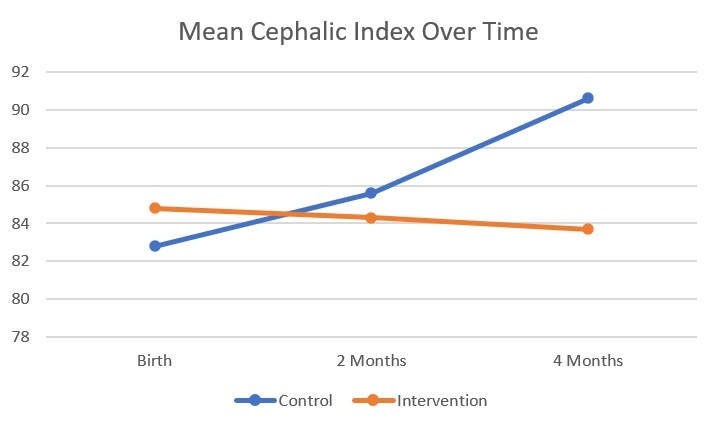Parental Education for the Prevention of Plagiocephaly
Mariam Chekmeyan*, Alex Joo, Sashrika Saini, Danielle Li, Katharine P. Playter, Lisa Nguyen, Mark Vining, Janice F. Lalikos
UMass Chan, Hopkinton , MA
The American Academy of Pediatrics introduction of the Back-to-Sleep Campaign significantly reduced infant mortality from sudden infant death syndrome. As a result of prolonged supine positioning, the incidence of deformational plagiocephaly has risen 5-fold. Cephalic index (CI), the ratio of head width to length, is a metric used by insurers for plagiocephaly helmet authorization. Our recent work has shown the average CI has significantly increased from established pre-Back-to-Sleep norms, unnecessarily indicating helmets for many infants. We aim to improve the current educational paradigm for new parents within the confines of the Back-to-Sleep Campaign and hypothesize that the addition of plagiocephaly focused education will reduce CI.
Children were screened at their newborn visit. Premature newborns and those diagnosed with craniofacial disorders were excluded. CI, obtained using manual calipers, was used as a proxy for all deformities associated with plagiocephaly due to its ease, accuracy and reproducibility. Subjects randomly assigned to the intervention group were shown a two-minute video and given a pamphlet on plagiocephaly prevention. A difference-in-difference analysis was performed.
40 total subjects were enrolled with 16 two-month follow-ups and 10 four-month follow-ups. The average baseline CI for the control group (cCI) and intervention group (iCI) were 82.8 and 84.8 respectively. At two months, average cCI was 85.6 and iCI was 84.3, with a mean CI difference from baseline of 2.8 and -0.5 in control and intervention groups, respectively (p = 0.22). At four months, average cCI was 90.6 and iCI was 83.7, with a mean CI difference from baseline of 7.8 and -1.1 in control and intervention groups, respectively (p = 0.04).
Parental education at the newborn visit led to decreases in CI at two and four months compared to control patients, which is the ideal timing for intervention. Parental education is a simple intervention with the potential to reduce parental stress and health care costs associated with the evaluation and treatment of plagiocephaly.
Back to 2023 Abstracts


